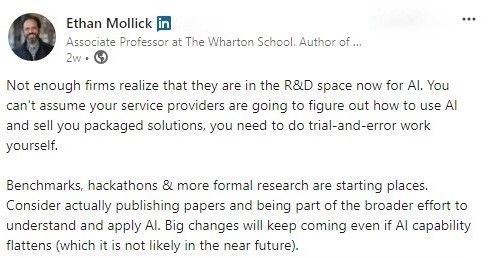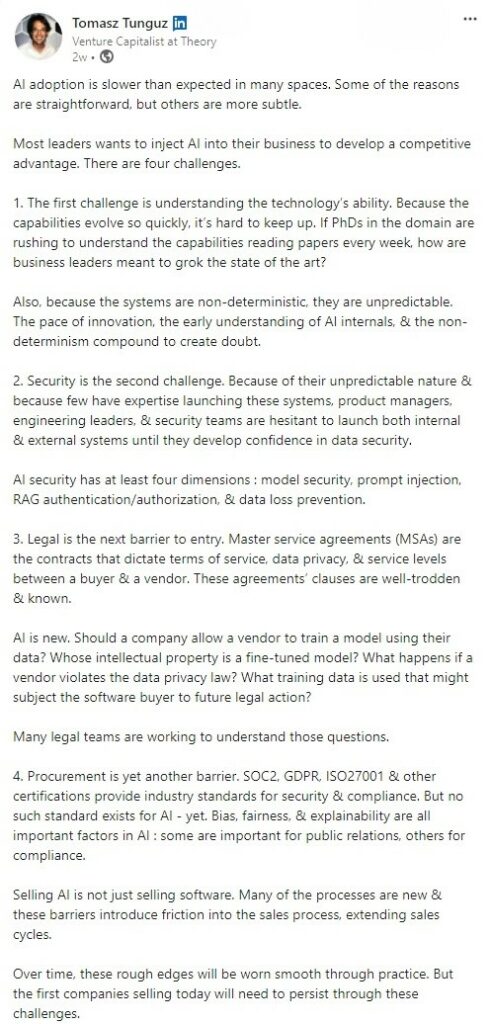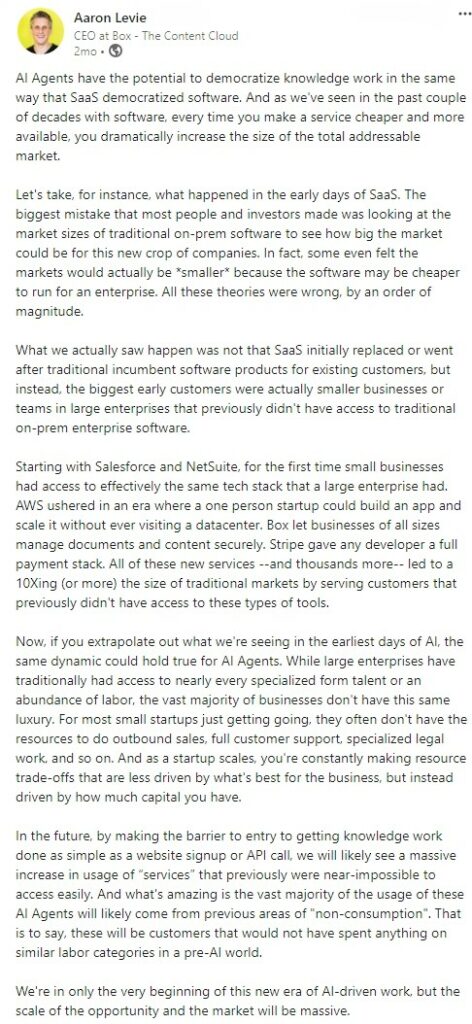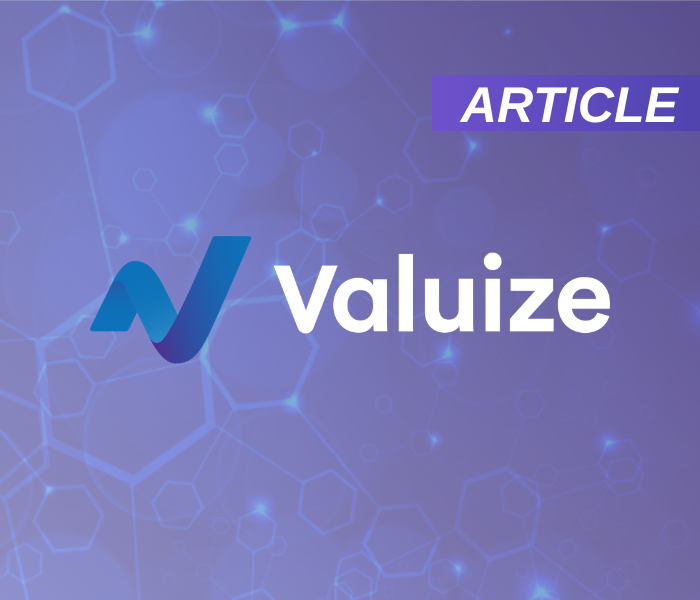Don’t you wish you could fast forward that blockbuster movie we’re all watching together at this very moment? Maybe even more so because we’re not just watching it… we’re all playing roles in it too. The movie is AI is both scary and boring and I can’t wait to get to the climax in which it will not be revealed that there are autonomous Boston Scientific robot gangs roaming and pillaging a smoking landscape. Sorry for the spoiler but it’ll be much more prosaic.
The grand reveal will be that the biggest impact artificial intelligence is going to have on our business lives will be on making many of those mundane but important tasks of our daily lives disappear from view. They’ll still function, the work will still get done, but they will be acting in their new role as our hidden away and far-more-efficient-than-us servants. When that day comes, we might begin imagining ourselves as the upstairs leisurely people in Downton Abbey. The last part of the AI movie will have us all lounging around with much more time on our hands. The cliffhanger will be… will business people figure out what it means to finally be productive in their jobs in ways that directly and unambiguously affect the company fortunes? What happens when the abstraction of time-wasting manually operated tools and processes is removed? What will we do with all of our time once we are no longer able to lean on the excuse that in order to accomplish what we needed to do, we had to rely on time sucking, mundane and sometimes menial, processes?
AI and jobs and why it’s happening
Every job in a company will be impacted in some way by AI, according to the International Monetary Fund, and especially so in advanced economies due to the preponderance of knowledge-based work. I believe this shift, while daunting, is necessary for the benefit of companies, societies, and individual well-being, and ultimately, it should benefit the most important constituent, the customers, who will receive all the downstream advantages delivered by a company’s improved efficiency.
We shouldn’t fear such change because many tasks we currently perform are mundane and time-consuming, and are often so abstracted from the outcomes that we can’t see a connection. AI has the potential to eliminate these tedious processes, allowing us to focus on more impactful work, work that has a more direct connection to results.
The impact on Customer Success will be more than you think
It’s important to first state that many Customer Success (CS) professionals are already using artificial intelligence (via many 3rd party tools), and GenAI specifically, on a daily basis. Based only on a casual reading of LinkedIn posts, you might think Customer Success has embraced all the technology. But, like many people studied in this HBR report called How People Are Really Using GenAI, it appears most CSMs are using it in haphazard ways and only as individuals in an attempt to improve the quality and speed of the work they do for themselves. On its face, that’s not a bad thing. It’s probably a reaction to all the hype we’re subjected to – who wants to be left behind? – but it could also be a genuine desire to learn how to leverage some new technology because they suspect it will help them in the long run. But, the impact of that kind of scattered approach on a company’s fortunes, while difficult to measure with precision at this point, is most likely close to nil. Or, put another way… how’s that attribution coming along? Marketing has been down this road for decades and they’ve been doing it in a coordinated manner. It’s challenging to try hard to leverage tech to move the mission and thread the needle to find the holy grail of a direct connection between effort and revenue.
The people studied in the report generally aren’t employing GenAI as part of a coordinated and collaborative effort managed through a central group (operations or strategy teams) which would make more sense for a company interested in ensuring there is alignment with certain standards in order to accomplish collective or departmental goals. For that to happen, it’s logical to think a company would need to fold GenAI under the umbrella of its governance model. The renowned Ethan Mollick, Wharton professor and author of Co-Intelligence, an immensely popular book about Generative AI, describes the situation accurately in this LinkedIn post.

It’s time to direct GenAI energy at the systems and programs level
Since we’re all in the R&D space now, as professor Mollick says, it makes sense that companies get their strategic arms around the adoption of GenAI and AI (to connect it all to the broad corporate strategy) in order to save time later (which will inevitably be necessary) and to tame the over-enthusiasm we see amongst individuals.
A SaaS industry guru, Tomasz Tunguz, published this on June 28, 2024 and it’s a good encapsulation of the challenges facing companies as they try to embrace and leverage AI for their businesses. Beyond the flash of the hype, it’s not an easy thing to do and it’s not being adopted anywhere near the extent that the media likes to portray.

Customer Success already has a long history of building programs in order to scale individual effort across large customer segments so the concept of getting efficiency boosts from GenAI should be easy to comprehend. But I don’t want to tackle what I think is surely the simplest use case for GenAI and quickest win in Customer Success. That is, scaled CS, or Digital CS, or one to many, or light touch…. a myriad of monikers to describe CS for the largest segment of customers, the low ARR ones. I think a far more compelling use case, and one that could offer immensely more revenue value for the company is when GenAI, and AI more broadly, is applied to support the CSMs in the high touch or strategic accounts segment. That’s the segment where far less automation has been introduced, where so much more control (and frankly, resistance to change) is still in the hands of CSMs, and, consequently, so many more variances exist in the customer experience. The scenario surfaces the following risks to business, to name just a few.
- Inconsistent service across the segment, because it’s too reliant on sometimes wildly varying individual skills and varying personalities of the CSMs
- When interviewing customers in a segment, it can be surprising to hear how one customer describes their experience versus how another describes theirs. It can often sound like they are dealing with different companies.
- Research quality and intensity varies from CSM to CSM and account to account and with little to no governance in place. This can manifest as different guidance for different customers at the same point in their journey with the solution.
- Service quality depth varies from CSM to CSM and account to account because it’s often too reliant on a CSM’s personal relationships with members of other organizations from which information or task completion is required.
- Poorer overall documentation of account activities. CSMs can suffer from the same condition as the salespeople they criticize, and for similar reasons. They don’t always record or document all the important activity that’s happening in their accounts.
It probably doesn’t need to be said but I’ll state it anyway. Customers are allergic to inconsistencies, obfuscations, and opaqueness. Customer Success high touch models are too prone to these things.
If you ask high touch CSMs how they go about doing their jobs, you’ll recognize the pattern of frustration (described earlier) of tasks and responsibilities that require too many steps, take too long, are too prone to error, are boring, etc. It’s easy to imagine how those factor into the experience of customers.
How can AI help?
If there exists a central group (create one if it doesn’t!) that is responsible for formulating and maintaining standards, common processes, enablement, templates, and tools, then AI usage by all of Customer Success can fall into that team’s remit. It could focus on doing things like:
- Proactive and automated research and insights generation about each account for all CSMs for their entire portfolio
- Automated, ongoing, broad and deep benchmarks of segments which could be used to set up triggered insights when standard account behavioral thresholds are breached
- In the moment, expert guidance for CSMs as they work with clients (GenAI in the hand)
- Build AI agents – I like how Aaron Levie, CEO of Box, talks about the tech on his busy X account. But this LinkedIn post of his, and especially in paragraphs 5 and 6, is also a good sample.

We (or rather, the central team) should think about how AI agents can be employed to extend the reach of CSMs, by doing for them much of the heavy lifting they are normally required to do. At that point, CSMs will find themselves at the cliffhanger part of the movie. What happens next? What will they be able to do with all that extra time? Does extra time automatically mean their jobs are redundant and they’ve been subsumed by AI and made victims of it? Is that the way Customer Success ends? With a whimper?
I don’t think so. Here’s a clue for how Customer Success professionals should think about what happens next once AI has removed all the mundane activities from their jobs. Maybe they can get up off the couch like blacksmiths did when the automobile made their work obsolete. They adapted and went to work for higher order tool and die shops that made parts for the new industry. They didn’t fade away. They figured it out. CS pros need to figure out how to out-think AI and they can start by understanding that customer value will always be the main goal of all businesses. CS pros will always be relevant if they can answer two questions. How do I add value to the customer relationships, and how do I help customers in their pursuit of value?






